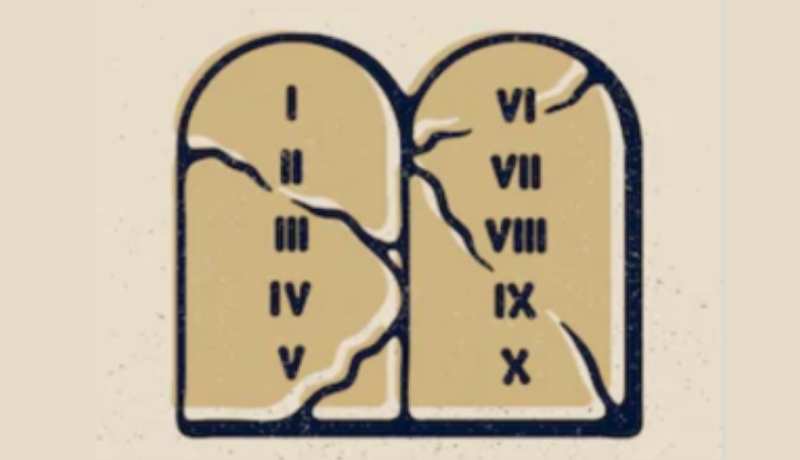The Commandments as the 16 MBTI Types
Each Myers Briggs Type by virtue of their professed personality preferences operates according to the values that they deem important. We each have a hierarchy of values that determine what we prioritize. Whether they come from our own personal thoughts and feelings or drummed into us by society and our community. If each MBTI had the power to give 10 commandments for living according to their ideals, here’s what they might look like.
INFJ
1. “Thou shalt develop self-understanding so that thou might understand others.”
INFJs are keen on developing self-knowledge but much of what they learn about themselves comes through their interactions with others. INFJs like to psychoanalyze and better understand what’s going on in their head but a lot of their insight is intuitive and hard to put into words. Most INFJs would agree that the more self-knowledge they acquire, the better they are at helping and relating to others. Much of the conflict in the world stems from misunderstandings that could be at least partly alleviated if we understood ourselves better.
INFP
2. “Thou shalt first seek to understand others before casting judgment upon them.”
INFP doesn’t much appreciate being judged or criticized (as their inferior Te might suggest). They of all people understand the importance of at least making an effort to understand the rhyme and reason behind an individual’s behavior because context and intention matters. INFP would impress upon others not to rush to judgment of other people or think in black-and-white terms. INFP would emphasize fair and open-minded consideration for other people’s perspective and where they are coming from.
INTP
3. “Whatsoever thou profess to be true, thou must justify with reason and evidence.”
The value that INTP would likely hold most sacred is intellectual honesty. INTPs respect knowledge and truth and strive to keep separate their subjective biases from interfering with their quest for true understanding. Furthermore, INTP doesn’t appreciate those who make truth claims based on faith alone or some spooky “feeling”. INTPs would wish for people to use their heads and avoid pretending to know things that they really don’t.
INTJ
4. “Whatsoever ye do, do so with excellence and efficiency.”
INTJ is someone who takes pride in their work. They strive to know their stuff and be excellent at what they do. Sloppy, shoddy work is like a cardinal sin in the INTJ holy book. Their performance reflects directly on them and the last thing they would want is for someone to look at what they’ve done and think it was the product of an incompetent individual. INTJs would almost certainly impress upon others this standard of quality and professionalism because it benefits everyone involved.
ENTP
5. “Thou shalt use thy knowledge to help others, not harm them.”
Uncle Ben once told Peter Parker, “With great power comes great responsibility” and this may be germane advice for the ENTP. Knowledge is power and the brightest ENTPs have the capacity to do great good in the world with their inventive brains, creating innovations that are a gift to humanity. On the other hand, this ingenuity can make them adept at devising con-schemes and scams. ENTP’s better angels (tertiary Fe) would encourage them to serve the greater good than just look after their own personal gain.
ENTJ
6. “Thou shalt respect other’s time, that they might respect yours.”
Time is money but time is also more precious than money. ENTJs don’t like to waste either and they are keen on managing their every minute doing things that really count. ENTJs have little patience for people beating around the bush or giving them the ol’ okee doke (whatever that means). They are direct and to the point and would much appreciate it if people showed them the same courtesy.
ENFP
7. “Thou shalt respect the individuality of others as you would have them respect yours.”
“Don’t generalize people” is basically what this command is all about. ENFP is an extravert who also maintains a strong sense of “self”, independent of the associations they have with others. They want to “self-actualize” and are protective of their individualism. ENFPs seek to define themselves rather than allow others to define them or objectify them or lump them into a group they never identified as or with. ENFP will let you know who they are and what they stand for so avoid slapping your labels on them willy nilly.
ENFJ
8. “Whosoever ye grace with your presence, let their lives be improved because of it.”
ENFJ is like ENTJ except they are more interested in being a better person than a better achiever. ENFJ would like to think that they have a positive impact or influence on people’s lives. Of course, this can also lead them to become too interfering in other people’s lives however well-intentioned. ENFJs would entreat others to set an example and be the change that they want to see in the world.
ESFP
9. “In whatsoever ye do, do it with love, joy and passion.”
ESFP expresses a certain joy de vivre that is eager to enjoy what life has to offer and not take everything too seriously. Like ESTP, ESFP would agree that life is too short to stay miserable. Sometimes, it is the energy and attitude that you put out that makes the difference and can attract better luck and opportunities for what you really want or need. Many ESFPs would likely agree that even if you’re not happy, content or confident with your circumstances, you can fake it till you make it and try to be grateful for what you have in the mean time.
ESTP
10. “Thou shalt make the most of today for tomorrow is promised to no one.”
Carpe diem is the ESTP motto because they have an appetite for thrilling experiences. Life is short and ESTP would hate to waste a good opportunity. In part because ESTPs have a low tolerance for boredom. For them, life is all about experiences and having the best ones possible and you’re not likely to do that by staying inside your comfort zone all the time.
ISTJ
11. “Thou shalt always show gratitude for the things ye benefit from but did not create.”
ISTJs are dutiful individuals who hold a special appreciation for legacy and heritage. They prefer to work within systems rather than create them. ISTJ enjoys learning details and procedures and will be very diligent in adhering to them and ensuring that prescribed standards be met. ISTJs are likely to feel gratitude for the fact that so much of the groundwork has already been laid out for them so that they can just appreciate it and respectfully do their part in preserving and maintaining it.
ISFJ
12. “Whatever thou desireth from others, thou must also be willing to provide to others.”
ISFJs like to help but don’t necessarily seek to be helped. Still, when they do seek help, they are not apt to ask for anything they are not willing to do for others in return unless it is something they are completely unable to do at all. In which case, ISFJ is sure to try and return the favor or express their gratitude. In other words, ISFJs do not profess an attitude of self entitlement and by the same measure would rather that others didn’t act entitled or take ISFJ’s generosity for granted.
ESFJ
13. “Thou shalt love thy neighbor and be charitable.”
ESFJs are all about the people and they seek to position themselves as a helpful person who others will value and appreciate. Furthermore, ESFJ promotes group harmony and desires to unite rather than divide. Being accepted by others and having a sense of belonging.is important to them and they in turn seek to make others feel welcome and valued. ESFJs would endorse any decree that promotes inclusivity and cooperation.
ESTJ
14. “Thou shalt render unto others what they are justly due and swindle them not.”
ESTJ is justice-minded and generally keen on being fair but firm. For ESTJ, many decisions are black and white and the shades of grey have less significance to them. At the same time, this can make them very honorable and reliable in enforcing and abiding by regulations. ESTJs believe in hard work and many other conservative values so they are inclined to reward that which has been earned and adjudicate situations in a way that is just and balanced.
ISFP
15. “Thou shalt have respect for art and all living beings and seek not to do them harm or damage.”
ISFPs have a special appreciation for the beauty in the world be it art or nature. They have discriminating tastes but are not necessarily shallow or superficial. Still, they like for things to look nice and pleasing and they have a kind spirit that wants to protect that which is precious and beautiful about the world including the miracle of life and the beautiful sensations they experience. Destruction, cruelty and defacement of art are some of the things that ISFP would deeply oppose.
ISTP
16. “Thou shalt mind thy own business and pry not into the affairs of others.”
ISTPs are private and independent and seek to earn their keep through hard work and dedication to their craft. As introverts they can be very territorial about what’s theirs and what they’ve built by themselves on their own merit. Furthermore, ISTPs dislike others who try to get too close and keep tabs on them and their activity. ISTPs let people into their lives on their terms but will otherwise keep most people at a safely impersonal distance.
related posts:
- Here is the Story Arc for Each MBTI Type
- What Each MBTI Type Will Do When The Robots Takeover
- The Parenting Style of Each MBTI Type
- The Freudian Complex That Best Describes Each MBTI Type
- Why You’re A Bad Person Based On MBTI Type
- The Ideal Dog Breed For Each MBTI Type
- The Intelligence Each MBTI Type Displays
- ISFJ and ISTJ in love: 5 Essential Dynamics of their Relationship - February 24, 2024
- ENTP and ENTJ in love: 6 Critical Dynamics of Their Relationship. - February 18, 2024
- ESTJ and ESFJ in love: 4 Key Aspects of their Relationship. - February 12, 2024






One thought on “The 10 Commandments of the MBTI Types”